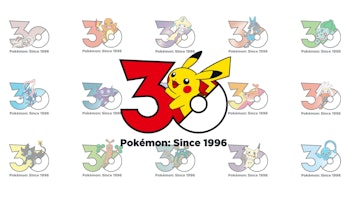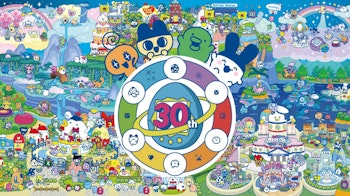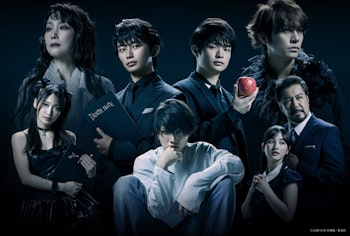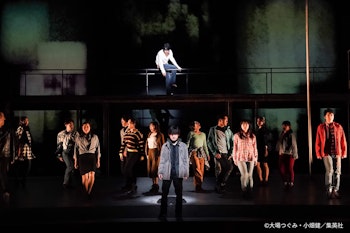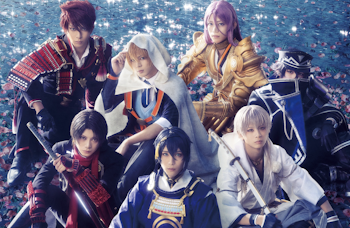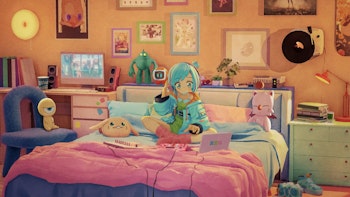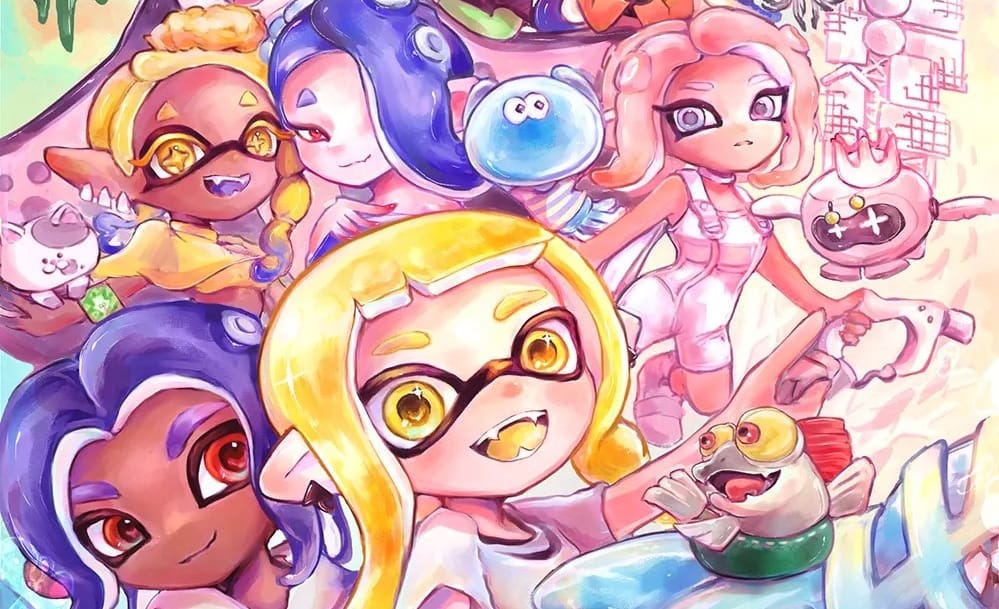
As many melt and cower under the heat of the sun, dedicated fans line outside Tokyo Big Sight for hours to discover new doujin from their favorite creative circles or anime and manga series. Comiket is the doujin event people associate with fan culture in Japan, especially from an outside perspective where the scale of the event’s complete takeover of one of Japan’s largest convention centers for the purpose of fan comics - many of a distinctly R18 nature - is far grander in scale than any international equivalent or American convention’s artist alley.
Events like this connect passionate fans under a shared joy of art and a series they love. Yet the lifeblood of doujin culture and hardcore fandom requires stepping far away from Comiket’s outsized shadow.
For 72 hours in mid-September, Splatoon 3 celebrated the end of two years of free updates to Nintendo’s beloved multiplayer team-based ink shooter with a Grand Festival. Far from just a celebration of Splatoon 3’s life, this was the culmination of 9 years of work on a franchise that signaled a turning point for Nintendo’s fortunes during the darkest days of the Wii U’s lifespan.
On the same weekend that Splatoon 3 celebrated its grand finale, 160 doujin circles gathered in a small hall in Ota on the outskirts of Tokyo for Splaket 24, an Only doujin event dedicated entirely to their collective love of this transformative franchise. Attending Splaket, I expected an intimate celebration of a tight-knit community embodied in a doujin event created by and for its biggest fans. I left with a renewed excitement for a series I love, buoyed by new connections with fellow fans.
Cultural Reset
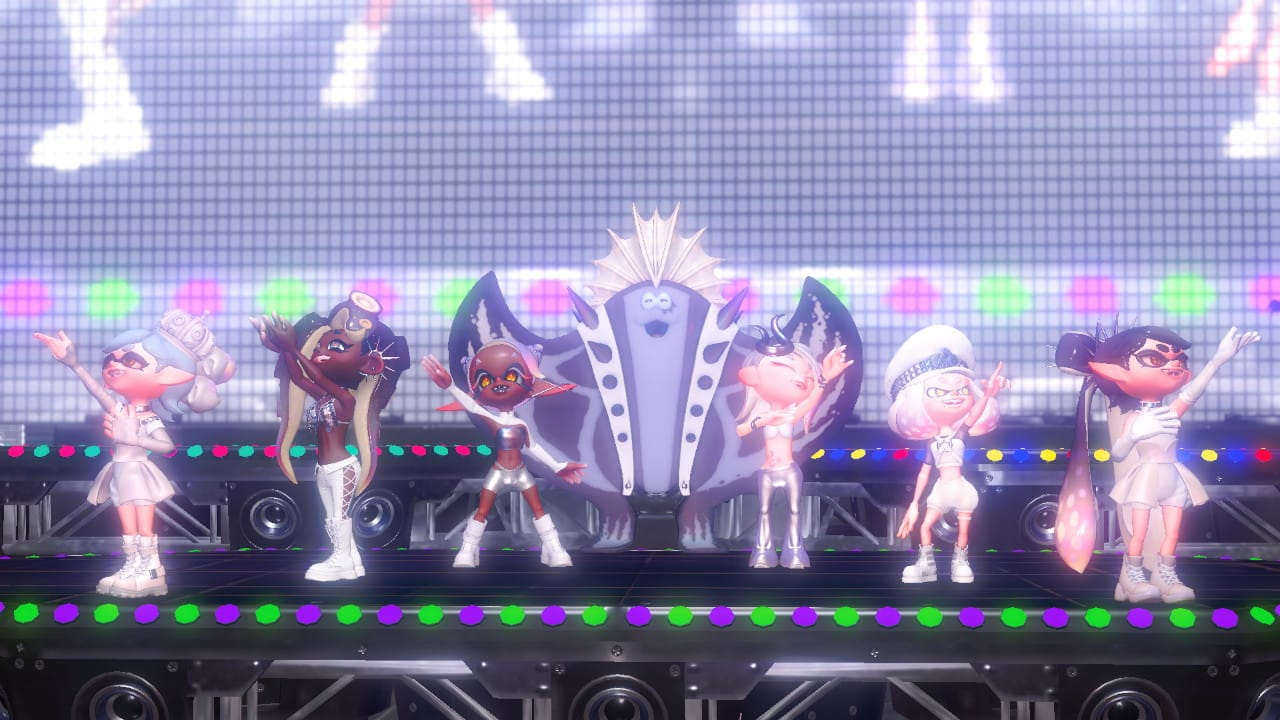
Splatoon was a game changer for Nintendo. At a time the company was losing relevance in the modern gaming industry with a console almost universally derided by all but a select few, the company once considered a dinosaur in online gaming somehow created a vibrant and unique territory-driven multiplayer shooter. It attracted fans both on and off the console, with the Inkling characters in particular a big hit.
Inklings were avatars, a self-insert in the chaotic world of the Inklings and Octolings. Key to their appeal was their in-depth customization, where you could not only customize your avatar’s appearance but buy clothes inspired by street fashion. In the heat of battle clothes offered stat boosts to your abilities, but outside of battle they were a squid-infused canvas for funky self-expression infused with the cool of places like Shibuya and greater Tokyo.
In-game idols like the Squid Sisters, Callie and Marie, or Off the Hook and Deep Cut in later games, technically represented these games and provided a pop soundtrack for battles and big events that allowed Inkopolis Square and the hubs of its sequels to be more than empty husks and set dressing, but your inkling was the star. They were an extension of the self, with fan art for the freedom of personal expression these avatar’s offered abundant long before the game even hit store shelves.
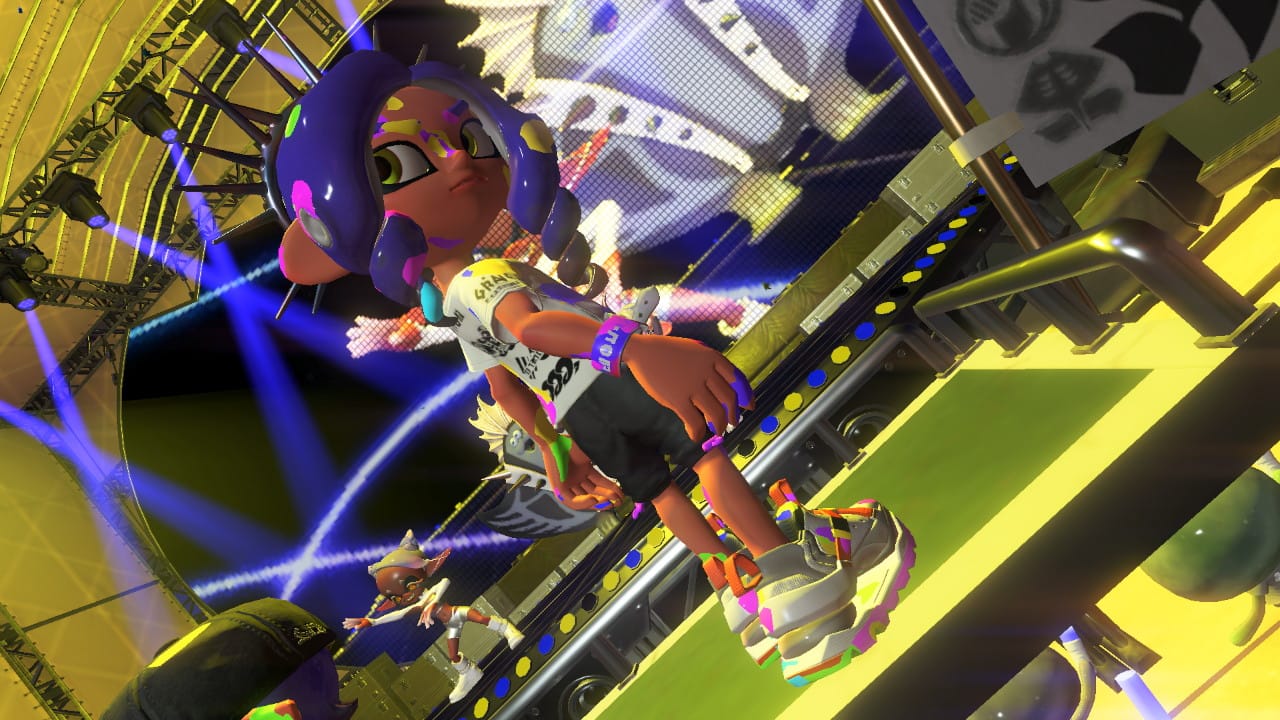
The game released to rave reviews and strong sales, but beyond sales ushered a larger cultural transformation. Splatoon made Nintendo cool again! Mario was popular, sure, but this was something teenagers and adults could identify with, an IP that could define the culture, not just exist within it. It was a phenomenon, a fashion statement, as everything from the way NPC inklings spoke to each other or existed in this world or the hints at a grander life beyond the walls of battle made for a rich world open to interpretation that inspired players and artists alike.
Today, it takes up just as much space inside a Japanese Nintendo store as Mario and Zelda, a testament to just how large the series has become. Fans around the world took this personalization as an opportunity to reinvent themselves and live vicariously through the series. In Japan, fans soon banded together to launch the inaugural Splaket, an Only doujin event whose first event took place in a small space inside Ikebukuro’s Sunshine City just 45 days following the launch of the original game in July 2015.
By sheer coincidence, Splaket 24 was scheduled to coincide with Splatoon 3’s Grand Festival. In normal times, Splatfests are themed around a basic question from which players divide themselves into teams over multiple days of Turf War battles to determine a winner. As the last Splatfest of the game, Grand Festival transformed the contest into a grand three-day festival aesthetically inspired by Burning Man, embodied in its desert setting and literally-burning concert venue. Deep Cut, the idols of this third entry, were joined by the Squid Sisters and Off the Hook, performing long setlists of their original music in stages within the hub and during matches, even coming together to sing an original song embodying the past, present and future theming of the event.
It was an emotional bookend to nine intense years of Splatoon, something that elevated these musical and cultural hallmarks to the center for a glorious sendoff.
Only Community Spirit
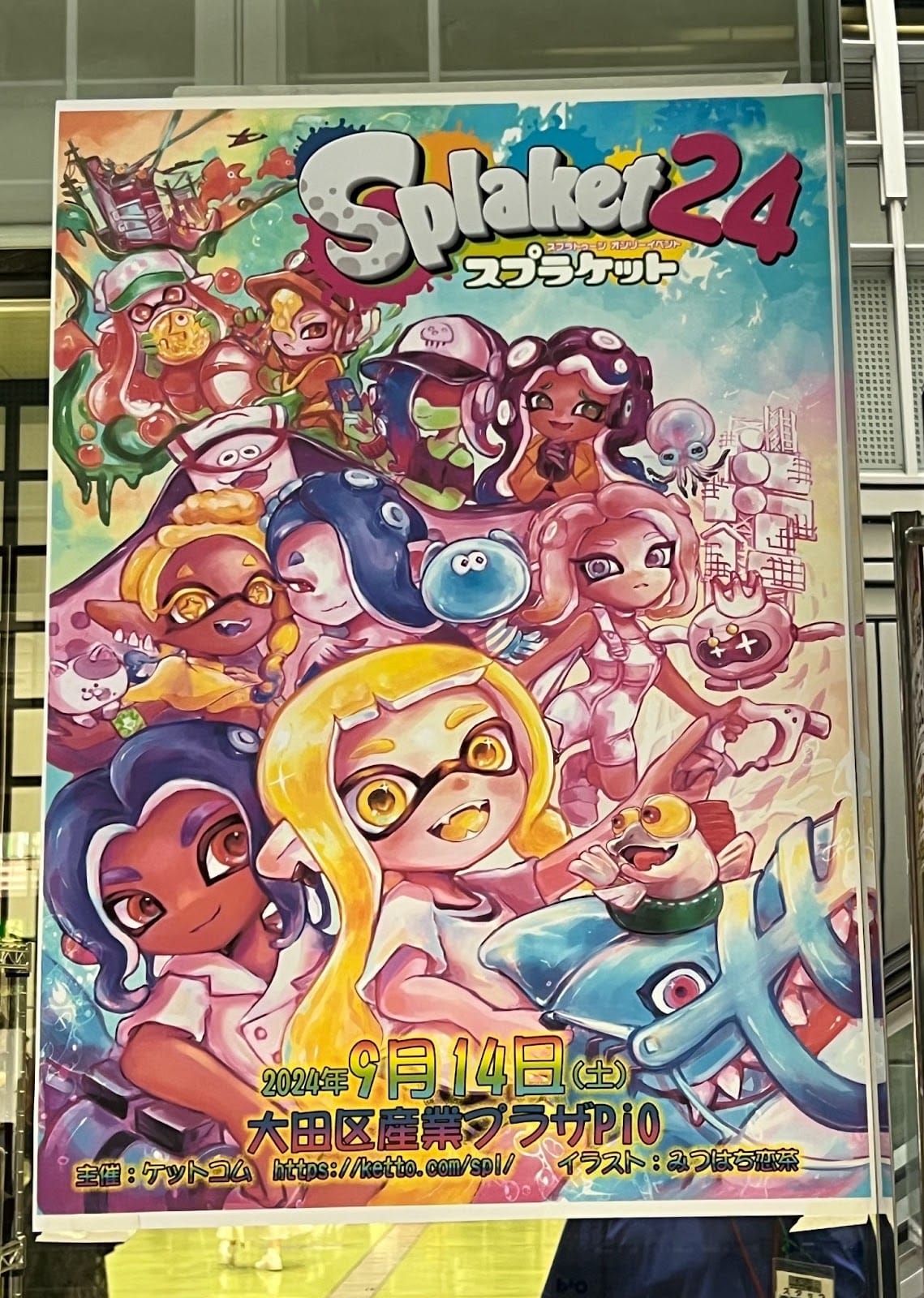
Similarly, upon entering Splaket, the vibes of such an event compared to the overwhelming grandiosity of a thousands-strong festival like Comiket couldn’t be more stark. While once upon a time you could track the legendary doujin event to something of this intimacy, that event is now a well-oiled machine. A jack-of-all-trades, but one that could never tailor itself to a single fandom. Only events like this fill that void, and across fandoms are a lifeblood of doujin culture.
Here, full-body cosplays embodying the Inkling and Octoling personas mingled amidst rows upon rows of hundreds of excited fans and artists were hundreds of fans embodying their love for the series with their own identity and flair. Whereas Comiket has grown to an extent that some inexperienced circles can struggle to participate against the waves of experienced groups that far exceed capacity, anyone with a passion had a space here, and were celebrated for their work equally.
At a smaller event like this, the joy of connecting and reconnecting with people is just as important as the event itself. As a first-time attendee and only a semi-regular doujin event participant, I initially took a more observatory wander through the floor. I did know in advance a few artists I follow on social media would be here, such as Mizusisi who released a new fanbook at the show reimagining battle stages and this world as something bustling and alive from glistening in the freshly-fallen rain or snow or even imagining the restaurants that exist just out of sight, and I obviously wanted to get this and thank them and others.
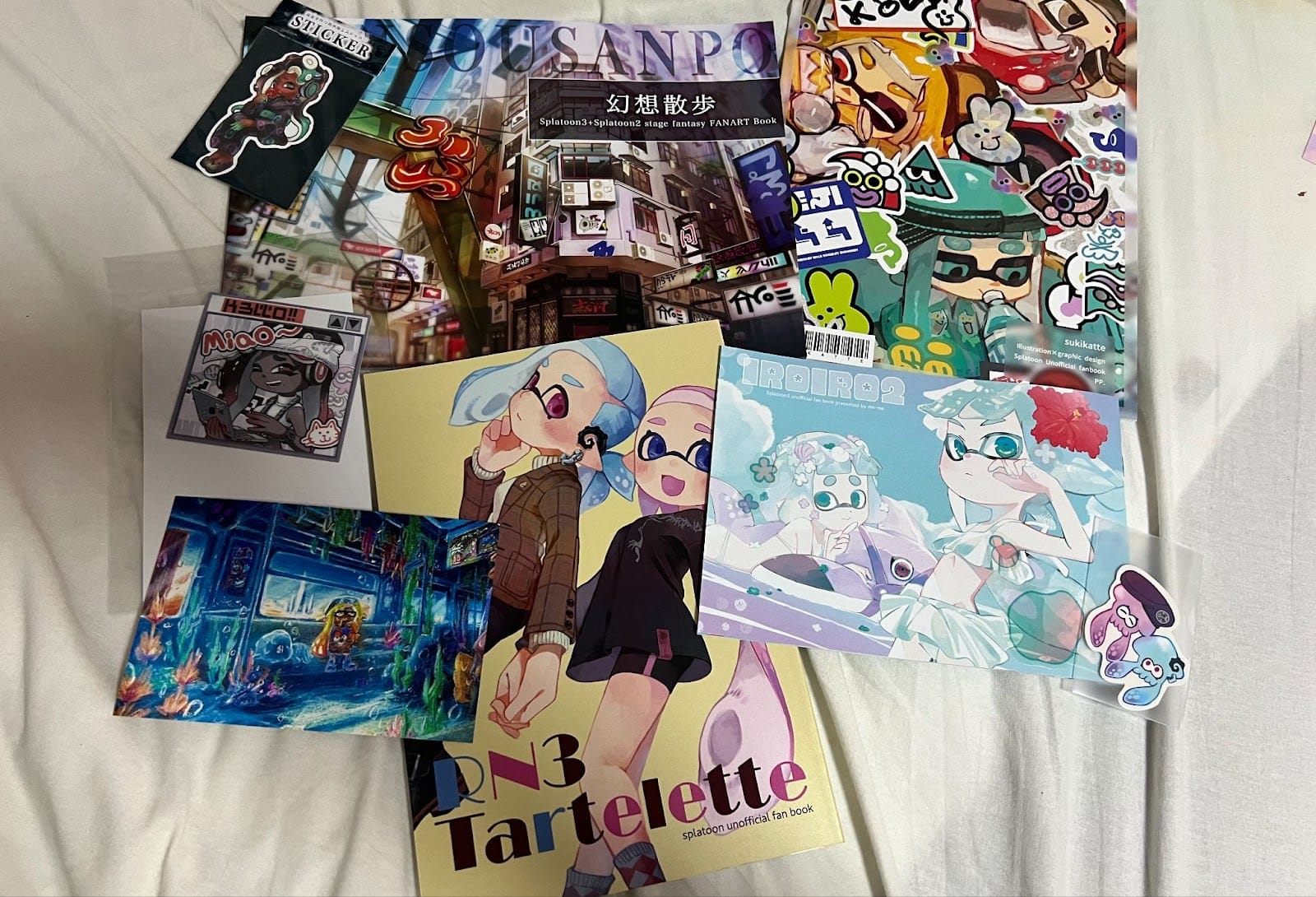
Although the idols can be considered representatives of the series, their appearance here was minimal compared to each circle centering their work on their own unique Inkling or Octoling, each with a rich life beyond the hustle of battle. They had friendships or relationships, at times sexual, and lived in our artist’s stead in Splatville. I found a new artist to follow in Asagi Suisen, whose RN3 Tartelette fanbook was like a series of vignettes inside the home life of a yuri couple trying to find a life together. At the end of it all, my regret was only picking up a few select books and postcards and leaving others behind.
There was a very DIY feel that matched the passions of fans. To counter the unexpected clash with the Grand Festival, monitors and Switch docks brought by staff to the venue allowed attendees to take a break to get in a few matches. The staff brought bentos and snacks for circles to share, and organizers had partnered with other Only events to rent the space as posters on the wall noted three other events with plans to use the area the following day. I would notice people eagerly chatting about the Grand Festival, and would never fail to spot the way everyone’s attention turned to the young girl attending with her mother that stole the show with her energy and Pearl cosplay.

As I made my return to Tokyo, I got my biggest smile noticing a group of schoolgirls giggling to one another over the doujin they bought. Each had matching Splatoon keychains dangling from their bags, and I overheard their conversations about planning matches in the Grand Festival that evening as they each parted ways. When I think about the importance of single-doujin events, I think of people like this: the sheer scale of Comiket may bring circles together, but it can’t unite a single community together like this.
It was a celebration of a community that felt more important this weekend than ever. The Grand Festival marked the success of a Nintendo experiment that transformed the fortunes of a company with an open-hand of gratitude to its fanbase. An original song produced for the event pleaded to fans to revel in the memories of the past, live in the present, and anticipate rather than fear a future filled with opportunity. As someone infatuated by the series since the beginning, wandering this show then witnessing all seven idols dance that virtual Burning Man, I was emotional and elevated beyond words.

After time away from Splatoon in recent months, I left Splaket as I was nine years prior. Events like this are important because they’re a space for like-minded fans, whether artists or simply those with a passion for a series, to meet and celebrate as one. The next Splaket may not be until early 2025, but you can guarantee that I will be back. I’m sure I will meet a familiar crowd at the next event, and that’s comforting. What better way is there to celebrate something you love?
